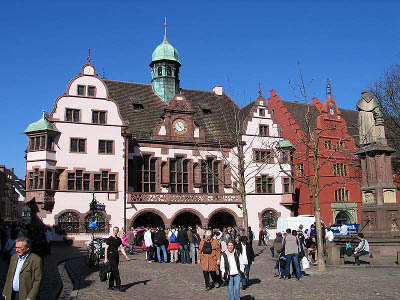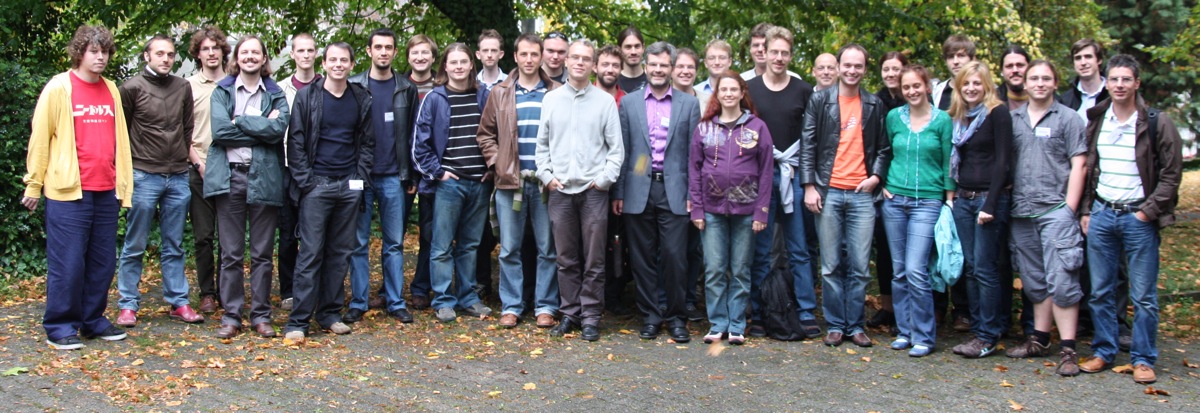FACETS CodeJam Workshop #3
7th-9th October 2009, Freiburg, Germany

Freiburger Rathaus - source: Luidger with permission under terms of GFDL
The first CodeJam focused on adding or improving Python support for different neuroscience simulators, and on the PyNN common simulator API.
The focus for the second CodeJam was expanded to include the next stages in the simulation workflow - analysis and visualisation of simulation results, and management of simulation projects to promote reproducibility and reliability.
The third CodeJam, aimed to catalyze development on a broad range of topics, including simulator interoperability, modeling langauge standardization, parallelizaion, Python tool-chain & abstraction development to further erode the complexity barrier facing computational neuroscientists, and much more ...
The general format of the workshop was to dedicate the mornings to invited and contributed talks on topics relating to simulation and collaborative software development in computational and systems neuroscience, leaving the afternoons free for discussions and code sprints.
Organization
The meeting was held at the Bernstein Center for Computational Neuroscience, located at Hansastr. 9A in Freiburg, Germany. The meeting was organised by Andrew Davison, Abigail Morrison, Eilif Muller and Bernd Wiebelt.
Participants
- Larissa Albantakis1
- Ismail Ari2
- Chris Ball
- Stefan Behnel
- David Colliaux3
- Andrew Davison3
- Moritz Deger4
- Mikael Djurfeldt5
- Jochen Martin Eppler4,6
- Luc Estebanez3
- Christian Garbers4
- Samuel Garcia7
- Marc-Oliver Gewaltig6
- Jose Guzman
- Michael Hines8
- Mike Hull9
- Kay Inagaki
- Sarah Jarvis
- Bernhard Kaplan10
- Andreas Klöckner11
- Jens Kremkow4,12
- Susanne Kunkel4
- Stefan Lang
- Abigail Morrison13
- Eilif Muller14
- Eric Müller10
- Dejan Pecevski15
- Mihai Petrovici10
- Hans Ekkehard Plesser16
- Philipp Rautenberg
- Moritz Schilling10
- Sven Schrader
- Klaus Schuch15
- Yuedong Song
- Bartosz Telenczuk
- Christian Tomm
- Bernd Wiebelt4
- Pierre Yger3
- Yury V. Zaytsev4,17
- 1Computational Neuroscience Group, UPF, Barcelona, Spain
- 2Boğaziçi University, Computer Engineering Department, Istanbul, Turkey
- 3UNIC, CNRS, Gif sur Yvette, France
- 4Bernstein Centre for Computational Neuroscience, Albert-Ludwigs-Universität, Freiburg, Germany
- 5INCF, Stockholm, Sweden
- 6Honda Research Institute Europe GmbH, Germany
- 7Université Claude Bernard Lyon 1, France
- 8Yale University, New Haven, USA
- 9Institute for Adaptive and Neural Computation, University of Edinburgh, Edinburgh, UK
- 10Kirchoff-Institut für Physik, Ruprecht-Karls-Universität, Heidelberg, Germany
- 11Divison of Applied Mathematics, Brown University, USA
- 12INCM, Marseille, France
- 13Diesmann Research Unit, RIKEN, Japan
- 14Laboratory of Computational Neuroscience, EPFL, Lausanne, Switzerland
- 15Institute for Theoretical Computer Science, Technische Universität Graz, Austria
- 16Dept. of Mathematical Sciences and Technology, Norwegian University of Life Sciences, Ås, Norway
- 17Institut für Mikrosystemtechnik, Freiburg, Germany

Meeting Program
Wed. 7th Oct. | ||
| 09:00 | Welcome | |
| 09:10 | NeuroTools I | |
| 09:10 | Andrew Davison | An overview of NeuroTools |
| 09:15 | Luc Estebanez and Pierre Yger | Data analysis with the "signals" and "analysis" modules |
| 09:50 | Luc Estebanez and Jens Kremkow | Importing data in text, NEX and Spike2 formats |
| 10:05 | Eilif Muller | Generating spike sequences with the "stgen" module |
| 10:10 | Andrew Davison | Managing model parameters with the "parameters" module |
| 10:15 | Andrew Davison | Caching intermediate results with the datastore module |
| 10:20 | Parallel Computation I | |
| 10:20 | Mikael Djurfeldt | MUSIC [PDF] |
| 11:10 | Coffee break | |
| 11:40 | Simulator updates I | |
| 11:40 | Jochen Martin Eppler | NEST [PDF] |
| 12:00 | Michael Hines | NEURON [PDF] |
| 12:20 | Parallel Computation II | |
| 12:20 | Eilif Muller | mpi4py tutorial I |
| 12:50 | Lunch | |
| 14:10-18:30 | Code sprints and discussions | |
Thu. 8th Oct. | ||
| 09:00 | Parallel Computation III | |
| 09:00 | Andreas Klöckner | PyOpenCl [PDF] |
| 10:00 | Eilif Muller | mpi4py tutorial II |
| 10:30 | Reproducible Research I | |
| 10:30 | Marc-Oliver Gewaltig | Reproducible network descriptions |
| 11:10 | Coffee Break | |
| 11:40 | Reproducible Research II | |
| 11:40 | Andrew Davison | Sumatra, an electronic lab book for simulation projects [PDF] |
| 12:10 | Philipp Rautenberg | Python, Neuron and the SQLdatabase |
| 12:25 | Hans Ekkehard Plesser | Graphical network descriptions [PDF] |
| 12:50 | Lunch | |
| 14:10 | Code sprints and discussions | |
| 14:10 | Andreas Klöckner | PyOpenCl Hands-on Exercises [PDF] |
| 16:00 | code sprints and discussions | |
| 19:00- | Banquet | |
Fri. 9th Oct. | ||
| 09:00 | Faster and better Python | |
| 09:00 | Stefan Behnel | Using the Cython compiler to write fast Python code [link to slides] |
| 10:00 | Chris Ball | Parameters and traits: extending Python attributes |
| 10:20 | NeuroTools II | |
| 10:20 | Moritz Schilling | Development status of the "plotting" and "utilities" modules [PDF] |
| 10:30 | Samuel Garcia | The architecture of OpenElectrophy and coordination with NeuroTools [PDF] |
| 10:45 | Christian Garbers | FIND - A unified framework for neural data analysis |
| 11:00 | Coffee break | |
| 11:30 | Simulator updates II | |
| 11:30 | Dejan Pecevski | PCSIM [PDF] |
| 11:45 | Stefan Lang | NeuroDune |
| 12:00 | Andrew Davison | PyNN |
| 12:10 | Hardware | |
| 12:10 | Eric Müller | The PyNN module for the FACETS wafer- scale neuromorphic hardware system [PDF] |
| 12:30 | Mihai Petrovici | The FACETS Demonstrator [PDF] |
| 13:00 | Lunch | |
| 14:20-18:30 | Code sprints and discussions | |
| 16:50 | Stefan Behnel | Cython Hands-on Exercises |

Unless mentioned otherwise, all the downloadable talks are licenced under a Creative Commons Attribution-Noncommercial-No Derivative Works License.
Support
The meeting organizers gratefully acknowledge the support of the European Union through the FACETS Project (grant no. IST-2005-15879) and the INCF. We also wish to express our great appreciation to the Bernstein Center for Computational Neuroscience in Freiburg for providing us with a great location and much assistance.